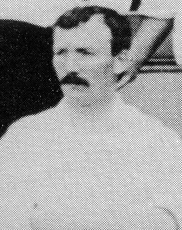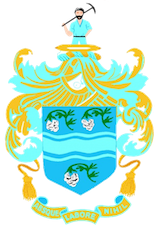1878 in sports describes the year's events in world sport.
Blackburn Park Road F.C. was a football team formed in 1875. They played in Blackburn, Lancashire, near to the railway station.

George Frederick Wheldon was an English sportsman. In football, he was an inside-forward with good footwork and an eye for goal who played for England and several Football League clubs, in particular for Small Heath and Aston Villa. In cricket, he was a right-handed batsman and occasional wicket-keeper, who played county cricket for Worcestershire in their early seasons in the first-class game.
Birmingham St. George's F.C. was a football club based in Smethwick, England. The club started as St George's FC in Aston, before moving to the Cape Hill brewery in 1886 under the name Mitchell St George's.
The 1967–68 season was the 88th season of competitive football in England. Defending First Division champions, Manchester United, became the first English team to win the European Cup, while the First Division title went to their cross city rivals City. West Bromwich Albion lifted the FA Cup this season, for the fifth time in their history. Leeds United won their first two major trophies when they lifted the Inter-Cities Fairs Cup and Football League Cup at the expense of an Arsenal side who had not played at Wembley for 16 years.
The 1891–92 season was the 21st season of competitive football in England.
The 1892–93 season was the 22nd season of competitive football in England.

James Daniel Ross was a Scottish footballer who played as an inside forward.

John Reynolds was a footballer who played for, among others, West Bromwich Albion, Aston Villa and Celtic. He was the first player to represent both Ireland and England internationally.
The history of Sheffield United Football Club, an English football club based in Sheffield, dates back to the club's formation in 1889.

William Harold Hendry was a Scottish footballer who played as a defender. Born in Newport-on-Tay he played in the Football League for Bury, Preston North End, Sheffield United, Stoke and West Bromwich Albion.
The 1888–89 Football League was the first edition of the Football League, which ran from the autumn of 1888 until the spring of 1889. Created and named in Manchester during a meeting on 17 April 1888, the Football League is the oldest professional association football league competition in the world.
Old Westminsters F.C. is an association football club composed of former pupils of Westminster School, London, England. They play in the Arthurian League.
The 1892–93 Football League season, was the fifth season of Football League. This season saw the introduction of the Second Division.

Darwen Football Club was an association football club from Darwen in Lancashire, England. The team, formed in 1870, was an early pioneer of professional football in Northern England, reaching the semi-finals of the 1880–81 FA Cup. They were a Football League member from 1891 to 1899. Darwen joined the Lancashire League in 1900 and remained in regional football afterwards. They last played in the First Division of the North West Counties Football League in 2008–09, when the club was wound-up. A successor team, AFC Darwen, was founded soon after. Darwen played their home games at the Anchor Ground.
The 1882–83 season was the fifth season in the history of West Bromwich Albion Football Club. This was the club's first season at their fourth ground, the Four Acres. The ground had been home to the West Bromwich Dartmouth Cricket Club since 1834, but the cricket club allowed Albion to play football matches there on Saturdays and Mondays. The club wore two different kits during 1882–83: as well as the chocolate and blue halves from the previous season, the club also sported narrow red and white hoops.
John Drummond was a Scottish footballer who played as a midfielder. Born in Edinburgh, Scotland he had spells with Partick Thistle, Preston North End, Sheffield United, Liverpool and Barnsley St. Peter's before retiring.

The history of Liverpool Football Club from 1892 to 1959 covers the period from the club's foundation, through their first period of success from 1900 to the 1920s, to the appointment of Bill Shankly as manager.
The 1892–93 season Test Matches were played on 22 April 1893. Accrington of Division One played Sheffield United of Division Two in a game at Trent Bridge, Nottingham which United won 1–0. A goal from United's Scottish forward John Drummond was enough to clinch victory for the Yorkshire side and saw them promoted to play in the First Division for the following season, with Accrington taking their place in the second.

Thorneyholme Road is a cricket and former football ground in Accrington, England. It is the home ground of Accrington Cricket Club, and was the home ground of Accrington F.C. from 1878 until 1896 when they dissolved.








